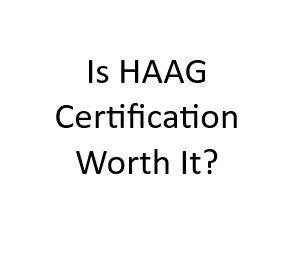Homeowners and insurance companies often rely on experts to assess and determine the extent of damage to a property, especially after a catastrophic event like a storm or natural disaster. This is where HAAG certification comes into play. But is HAAG certification worth it? In this blog post, we will explore the world of HAAG certification, its benefits, and whether it’s a valuable investment for those in the field of property damage assessment.
What is HAAG Certification?
HAAG Engineering, a respected forensic engineering firm founded in 1924, developed a certification program to ensure that professionals in the roofing, siding, and hail damage assessment industries possess the necessary knowledge and skills to accurately evaluate property damage. HAAG certification is often sought after by individuals working in the insurance, roofing, and construction sectors.
Benefits of HAAG Certification
- Credibility and Trustworthiness: HAAG certification instantly lends credibility to professionals. Homeowners and insurance companies are more likely to trust the assessment and recommendations of a certified HAAG inspector. This trust can lead to more job opportunities and increased business.
- Accurate Damage Assessment: The training and education provided in HAAG certification programs equip professionals with the skills to accurately assess property damage, including roof and siding damage caused by hail, wind, and other environmental factors. This accuracy is crucial for insurance claims and repair estimates.
- Consistency: HAAG certification promotes consistency in damage assessment. All certified professionals follow the same protocols and standards, ensuring that assessments are uniform and reliable.
- Competitive Edge: In a competitive industry, having HAAG certification can give professionals a significant advantage. It demonstrates a commitment to excellence and ongoing education, which can help individuals stand out in the marketplace.
- Networking Opportunities: HAAG-certified professionals often have access to a network of experts and peers in the field. This network can be invaluable for sharing knowledge, staying updated on industry trends, and collaborating on challenging projects.
- Higher Earning Potential: Due to the increased credibility and specialized knowledge that HAAG certification provides, professionals may be able to command higher fees for their services. Insurance companies and homeowners are often willing to pay more for the assurance of a certified expert.
Is HAAG Certification Worth It?
While HAAG certification offers numerous benefits, it’s essential to consider some factors before pursuing it:
- Cost: HAAG certification programs come with a price tag. However, many professionals find that the investment pays off over time through increased business opportunities and higher earning potential.
- Time Commitment: Becoming HAAG certified requires a significant time commitment, including coursework, exams, and ongoing education. Professionals should weigh this against the potential benefits.
- Industry Relevance: The value of HAAG certification may vary depending on your specific role and location. It’s essential to research whether HAAG certification is widely recognized and sought after in your area and field.
- Personal Goals: Consider your long-term career goals. If you plan to specialize in property damage assessment, HAAG certification can be a valuable asset. However, if your career path is different, the investment may not be as beneficial.
The Investment: Cost and Time
HAAG certification programs typically involve both a financial and time commitment. The cost of the certification itself, along with any associated study materials and courses, can add up. Additionally, candidates need to allocate time for studying and attending classes or webinars, which might require taking time off work.
It’s essential to calculate the return on investment (ROI) for HAAG certification. Consider factors such as the potential increase in income, additional job opportunities, and the long-term benefits of a more credible reputation in the field. Many professionals find that the initial investment in HAAG certification pays off over time as they gain more clients and charge higher rates for their services.
Industry Recognition and Geographic Relevance
The recognition of HAAG certification can vary by region and industry. While it may be highly respected in some areas, it might not hold the same weight in others. Before pursuing certification, research your local market to determine if HAAG certification is widely recognized and sought after by homeowners, insurance companies, and employers.
Furthermore, consider your specific role within the property damage assessment industry. If you primarily focus on roofing or siding assessments, HAAG certification may be highly relevant. However, if your work extends beyond these areas, explore whether there are other certifications or qualifications that may be more suitable.
Long-Term Career Goals
Your long-term career goals should play a significant role in your decision to pursue HAAG certification. If you aspire to specialize in property damage assessment, becoming HAAG certified can be a strategic move. It positions you as an expert in your field and provides a solid foundation for a successful career.
On the other hand, if you have broader career aspirations that may take you away from property damage assessment, HAAG certification might not be the most essential qualification for your path. In such cases, you may opt for more general certifications or invest in other areas of expertise that align better with your goals.
Staying Updated
HAAG certification, like many professional certifications, often requires ongoing education and recertification to ensure that professionals stay current with industry trends and best practices. Consider your commitment to continuing education and whether you have the time and resources to fulfill these requirements in the long run.
In Conclusion
HAAG certification undoubtedly offers significant advantages for professionals in the property damage assessment field. Its benefits, including increased credibility, accurate assessment skills, and competitive advantages, can pave the way for a successful career. However, the decision to pursue HAAG certification should be made after careful consideration of the associated costs, time commitments, industry recognition, and alignment with your career goals.
Ultimately, for many individuals, HAAG certification proves to be a valuable worth that not only enhances their expertise but also opens doors to new opportunities in the ever-evolving world of property damage assessment.
